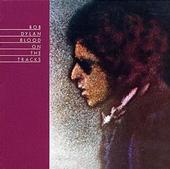Generally considered to be the greatest "break-up" album of all time, "Blood on the Tracks" proved to be arguably Dylan's most emotionally powerful work, whilst consistently ranking among the very top of his best-selling releases. This is Dylan at his most intimate, most vulnerable, and most real; finding himself staggering out of an apocalyptical level of person turmoil in the wake of a failed marriage, he chose to spill his guts to a world reeling in its own time of uncertainty. By putting his private life on the line in such a way, Dylan naturally became conscious of what was at stake with the release of "Blood on the Tracks," and at the last minute, re-recorded most of the album with a group of unknown Minnesota musicians in a bid to ensure that every aspect of its formula took on the right shape.
The brisk, up-tempo rumble of "Tangled Up in Blue" starts things off by jumping from scene to scene insecurely, as if to pause is to risk being defined, and so the song shifts restlessly, upending time, changing from third to first person, and embarking on a bohemian journey that speaks for generations at breakneck speed. It shouldn't take one long to realise that the running order of "Blood on the Tracks" is an absolute masterstroke that's intrinsic to its success, but it begins with the reflective, beautifully delivered "Simple Twist of Fate." The story of a one-night stand, Dylan's storytelling engages the picture of the encounter's aftermath: it meant nothing to her, forgetting it as she walks out the door, while it means everything to him, the introspective artist left absorbed in his own world (we get only details of the location and atmosphere, not of her). Burning with the implications that the ease of her departure brought, he realises not only that they're two entirely different people, but his failure to express himself openly and detach from that inner world will ruin any chance he may have of ever establishing a relationship.
On to the gut-wrenching "You're a Big Girl Now," which tracks heartbreak from the initial shock to the inability to remove one's reality from every reminding image that catches the eye, whether a hopeful one or not. The directness of lines such as "I can change, I swear," and "I'm going out of my mind," blow in as an unexpected, painful disruption to the easiness of the prior two tracks, which, in comparison, now seem to have avoided their respective issues completely. "Idiot Wind," on the other hand, is a scorching diatribe, full of scorn and contempt for any reminder of that lost love. Anger, blame, and paranoia rise sarcastically to condemn her poor understanding of what it actually takes to be him - the troubled, over-exposed artist. The organ virtually seethes viciously alongside Dylan's tormented (albeit articulate) outbursts as he vows to storm back down the "highway" he once started out on.
Following that draining eight-minute powerhouse (which, it has to be said, is essentially a focused tantrum), "You're Gonna Make Me Lonesome When You Go" provides a foil: an easy-floating sentiment obviously saved for another woman, the protagonist is just glad that the weight of prior relationships ("I've only known careless love" / "Relationships have all been bad") is nowhere in sight. Believing that this has all been put firmly behind him, the simple pleasure of feelings "more correct / Right on target, so direct" becomes an exciting one. The light, easy blues of "Meet Me in the Morning" works to clean the palette midway through "Blood on the Tracks," coolly arriving as a classic twelve-bar saunter that conjures up roosters and hound dogs to the sound of a delicious steel guitar - it's simple, but immensely effective.
"Lily, Rosemary and the Jack of Hearts," meanwhile, is an infamously unpopular Dylan track, its near nine minutes often the subject of frustrated criticism. Packed with Wild West-like action, it flicks simply from character to character around a saloon on the bed of a hootenanny beat. Still carrying a torch for an old flame, "If You See Her, Say Hello" poignantly replays the past, turning faded memories over like pages again and again. After an album repeatedly filled with the image of a broken man being left out in the rain, the fairytale "Shelter from the Storm" sings of seeking refuge in the arms of a calm, dynamically different other, only for the two to later find a wall between them, the fiery artist realising he's gotten more than he can handle: "I bargained for salvation, and they gave me a lethal dose."
Although its sweet, carefree melody sounds oddly out of place from everything that has passed before it, "Buckets of Rain" brings a sense of closure - the new direction that begins by finishing off the old on a high-note. Though not without moments of regret ("Everything about you is bringing me misery," "Life is sad, life is a bust / All you can do is do what you must"), its sung as dreamily as the buckets of moonbeams that roll through its beginning, and we're left with a brilliantly humble and optimistic belt of folk to hang everything on. With "Blood on the Tracks," Dylan takes to the trauma of compiling bitter regret together only to channel it expertly into a single artistic vision - one that was promptly heralded as a masterpiece. Re-igniting his muse and routing the old journalistic chestnuts of "going back to basics" and making a "come back album," "Blood on the Tracks" is a revealing glimpse at one of the world's greatest songwriters. Bob Dylan hasn't bettered it since.
